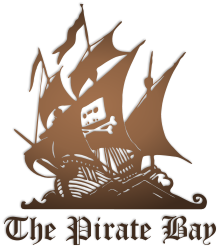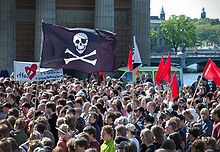- Copyright infringement of software
-
The copyright infringement of software (often referred to as software piracy) refers to several practices which involve the unauthorized copying of computer software. Copyright infringement of this kind is extremely common. Most countries have copyright laws which apply to software, but the degree of enforcement varies.
Contents
Existing and proposed laws
Main articles: Copyright infringement and History of copyright law The Pirate Bay logo, a retaliation to the stereotypical image of software piracy
The Pirate Bay logo, a retaliation to the stereotypical image of software piracy
The oldest legacy computer systems used today are still less than 40 years old, and the copyrights on them will not expire in most countries until about 2030. Changes, operating systems, network environments and user expectations usually make programs obsolete much faster than copyright expires.[citation needed]
United States
Under the proposed US Uniform Computer Information Transactions Act (UCITA), a controversial model law that has been adopted in Virginia and Maryland, software manufacturers are granted broad rights to shut down unauthorized software copiers without court intervention similar to some of the provisions found in Title II of the US DMCA, the Online Copyright Infringement Liability Limitation Act, which allows copyright holders to demand that an online service provider (OSP) expeditiously block access to infringing materials. If the OSP complies, it is granted a safe harbor, providing it immunity from infringement claims. If it does not comply, it does not become liable, but may instead rely on the protection of the Communications Decency Act.
Title I of the US DMCA, the WIPO Copyright and Performances and Phonograms Treaties Implementation Act has provisions that prevent persons from "circumvent[ing] a technological measure that effectively controls access to a work". Thus if a software manufacturer has some kind of software, dongle or password access device installed in the software any attempt to bypass such a copy protection scheme may be actionable — though the US Copyright Office is currently reviewing anticircumvention rulemaking under DMCA — anticircumvention exemptions that have been in place under the DMCA include those in software designed to filter websites that are generally seen to be inefficient (child safety and public library website filtering software) and the circumvention of copy protection mechanisms that have malfunctioned, have caused the software to become inoperable or which are no longer supported by their manufacturers.
Limitations
Copyright only protects the artistic expression of the work, and not its technical form, nor R&D.[1] Substantial modification to an original work, might create a way for a third party to claim they independently authored a work if it cannot be proved that the original work was used. For example, original source code may be sufficiently altered to overcome copyright's Substantial similarity requirement, by using a combination of Obfuscated code techniques, including: symbol renaming, flow-control alteration, function in-lining or externalization, argument overloading, class-inheritance restructuring[dubious ] . Obfuscation tools and strategies [2] exist publicly that aide in these techniques, even while copyright infringement is not their intended purpose. On the other hand, two separate authors may independently write code, whether days or years apart, that is so similar that AFC and other tests may find that they match, even when no copying actually occurred.
Evaluation of alleged software copyright infringement in a court of law may be non-trivial; if an original work is alleged to have been modified, then tests such as the Abstraction-Filtration-Comparison test (AFC Test)[3][4] are used to detect infringement. The time and costs required to apply this test naturally vary based on the size and complexity of the copyrighted material. Furthermore, there is no standard or universally accepted test; some courts have rejected the AFC Test it in favor of narrower testing criteria.
The effects of copyright infringement on digital culture
Claims of severe adverse effects
According to studies conducted jointly by BSA and IDC, in 2009 losses from software piracy have exceeded $51 billion.[5]
In addition, it has been claimed that reducing piracy rates would provide significant economical benefits:
Lowering software piracy by just 10 percentage points during the next four years would create nearly 500,000 new jobs and pump $140 billion into ailing economies.— John Gantz, chief research officer at IDC[6]According to a BSA/IDC studies, the highest piracy rate comes from Armenia, with piracy rate of 93%. China and India are at No. 17 and No. 41 respectively , with 82% and 69% of recorded Software Piracy rates.[7] The lowest piracy rate, according to survey, is observed in USA, at 20%.
It should be noted though, that methodology of these studies has been heavily criticized.
"Lesser evil" concept
Some software producers see the pirating of their own software as a "lesser evil" than the purchase or even piracy of a competitor's software. Jeff Raikes, a Microsoft executive, stated that "If they're going to pirate somebody, we want it to be us rather than somebody else." He also added [8] that "We understand that in the long run the fundamental asset is the installed base of people who are using our products. What you hope to do over time is convert them to licensing the software." In a different case, Microsoft has admitted that piracy of its Windows operating system has helped give it huge market share in China that will boost its revenues when these users "go legit." Bill Gates said, "It's easier for our software to compete with Linux when there's piracy than when there's not."[9] He has also said in reference to China:
As long as they are going to steal it, we want them to steal ours. They'll get sort of addicted, and then we'll somehow figure out how to collect sometime in the next decade.Developing countries
As most commercially exploited proprietary software is developed in the United States and Europe, some critics in the developing countries of the world see this as an indirect technology transfer tax on their country preventing technological advancement and they use this type of argument when refusing to accept the copyright laws that are in force in most technologically advanced countries. This idea is often applied to patent laws as well. Traian Băsescu, the president of Romania, stated that "piracy helped the young generation discover computers. It set off the development of the IT industry in Romania."[11]
The debate about software piracy acceptance in developing countries still continues. In 2011, the Business Software Alliance announces that 83 percent of software deployed on PCs in Africa has been pirated (excluding South Africa).[12]
Moral issues
Surveys indicate that software piracy is generally regarded as an issue of low moral intensity.[13]
Copyright and free software
Certain free software licenses (most notably GPL) substantially rely on existing copyright law. It is not possible to enforce GPL other than within the framework of existing copyright law.[14][15] As GPL being strongly associated with word Copyleft, there is certain confusion about GPL and copyright, but despite somewhat confusing wording, copyleft is indeed one of copyright licensing schemas.
Anti-copyright infringement organizations
- Business Software Alliance (BSA)
- Canadian Alliance Against Software Theft (CAAST)
- Federation Against Software Theft (FAST)
- International Intellectual Property Alliance (IIPA)
See also
- Abandonware
- Anti-copyright
- Australian copyright law
- Computer Associates Int. Inc. v. Altai Inc.
- Copyleft
- File sharing
- Jacobsen v. Katzer
- Open Letter to Hobbyists
- Product activation
- Software copyright
- Warez
- Windows Genuine Advantage
References
- ^ http://www.ladas.com/Patents/Computer/SoftwareAndCopyright/Softwa06.html#fn30
- ^ http://www.cs.arizona.edu/~collberg/Research/Students/DouglasLow/obfuscation.html
- ^ http://www.ifosslr.org/ifosslr/article/download/30/54
- ^ http://www.linux.com/archive/feature/113252
- ^ BSA Piracy Study: Quantifying Piracy Data Easier Than We Thought
- ^ BSA Reports $51 Billion Worth of Software Theft in 2009
- ^ Fifth Annual BSA and IDC Global Software Piracy Study
- ^ http://arstechnica.com/journals/microsoft.ars/2007/03/12/microsoft-executive-pirating-software-choose-microsoft
- ^ The Economist. Piracy: Look for the Silver Lining (July 19th-25th, 2008 ed.). pp. 23
- ^ "Gates, Buffett a bit bearish". CNET. July 2, 1998. http://news.cnet.com/2100-1023-212942.html.
- ^ Nathan Davis. Thanks for letting us pirate. 5 February 2007.
- ^ "Software Piracy (Infographic)". August 22, 2011. https://torrentfreak.com/software-piracy-110822/.
- ^ Logsdon, Jeanne M.; Thompson, Judith Kenner; Reid, Richard A. (November, 1994). "Software piracy: Is it related to level of moral judgment?". Journal of Business Ethics (Journal of Business Ethics) 13 (11): 849. doi:10.1007/BF00871698. ISSN 0167-4544
- ^ Should copyright be abolished
- ^ The Sustainable GPL
External links
Categories:- Copyright infringement of software
- Computer crimes
Wikimedia Foundation. 2010.

